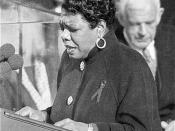Maya Angelou's I Know Why the Caged Bird Sings chronicles the early years of the author's life - up to age seventeen. In the book, Angelou poetically describes the phenomenon that is growing up black, in the south, in the time before and during World War II. I believe that you are expected to interpret this as a memoir of overcoming the odds. I believe that you are expected to regard the happenings of this book with feelings of empathy and/or sympathy. You are also supposed to marvel at the way Angelou persevered to become the woman (and writer) she is today.
At the end of the prologue, Angelou states that, "If growing up is painful for the Southern Black girl, being aware of her displacement is the rust on the razor that threatens the throat." (4)
The razor to the throat is symbolic of authority. To a Southern black girl in the 1930's and 40's, authority is almost everyone.
Young black female was the absolute bottom of the barrel. She must let herself be ruled by all sorts. Older black kids, black adults, and anyone white. Likewise, these people are ready to pounce on her should she do the least little thing wrong. Everyone was reprimanded for one thing or another as a child. No one enjoyed it. Imagine being surrounded by people, just waiting for you to slip up so that they can yell at you, punish you, etcetera. Through this, Angelou gaines your sypathy, and you may very well find yourself in awe that Angelou made it through such a childhood with her sanity intact.
When a young Maya Angelou's grandmother tried to take her to a white dentist who owed her a favor, the dentist said, "'Annie, my policy is I'd rather stick my hand...


